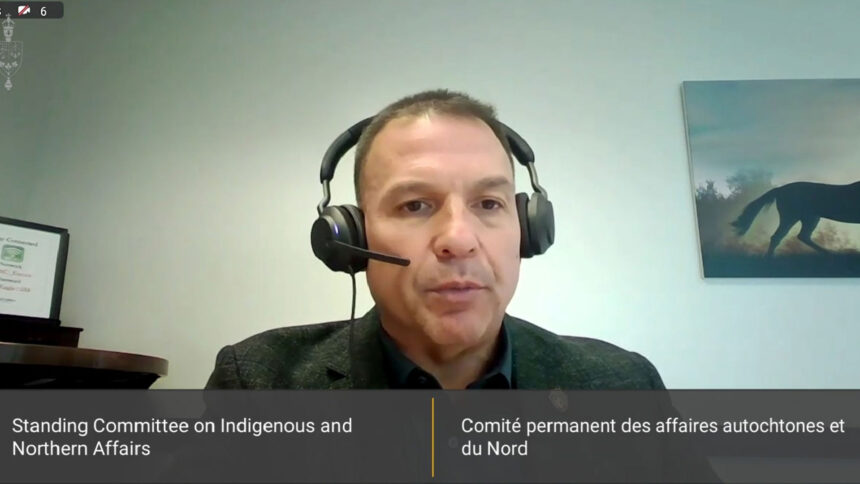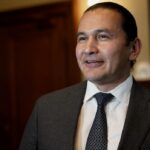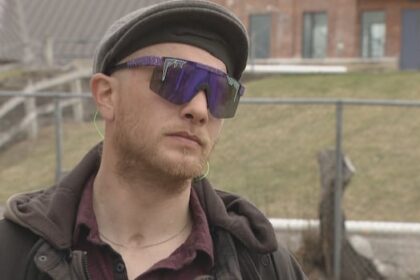The head of the Kahnawake Mohawk Territory Police in Quebec says Indigenous police forces are struggling to operate without the designation of being an essential service. “First Nations communities, Inuit communities, they deserve service that’s on par with or even better than what’s out there. The only services that are capable of doing that are Indigenous services,” Zacharie told APTN News. “What I wanted to impart to the committee was, if we become extinct, there’s going to be a gap. And then who fills that gap?” The Kahnawake Peacekeepers are one of the only self-administered police services in North America composed entirely of Indigenous officers. Speaking to the House of Commons Indigenous and Northern Affairs committee which is examining First Nations and Inuit policing, Zacharie said funding shortfalls make it difficult for many communities to support their own police services. “There are 36 self-administered First Nation Indigenous police services and they are policing about one-third of the country’s land mass,” said Zacharie, who is also the former head of the First Nations Chiefs of Police Association. “That’s about 156 communities across the country. And right now, they’re all struggling.” In an interview with APTN News, Zacharie said some Indigenous police services have shut down, replaced by the RCMP or provincial bodies, and others may follow. “We don’t get the resources we need,” he said. “We can’t go on. We’re closing our doors. And then another service, whoever that is, comes in and does it.” The RCMP, the Ontario Provincial Police or the Sûreté du Québec (Quebec’s provincial police, commonly called the SQ) are the forces that replace Indigenous police services, and Zacharie says they cost a lot more than local policing. “[The cost] is going to be two, three, four, ten times higher than it was. And who’s going to foot the bill then? Are they going to hire people who speak the language?” Chief Steeve Mathias of Long Point First Nation, located at the Winneway settlement in Quebec’s Abitibi-Témiscamingue region, told the committee that he recalled the six years he spent as the community’s only police officer, working “seven hours active and 17 hours standby.” At one point, Long Point signed a tripartite agreement with the federal government and Quebec. However, he said he felt that agreement was presented as non-negotiable, and when the community couldn’t arrange for an additional $100,000 for policing, they didn’t renew it in 2006. That ended local policing in Long Point. Chief Steeve Mathias of Long Point First Nation speaks to the House Standing Committee on Indigenous and Northern Affairs, October 29. Screengrab from video on ParlVu “After they shut down our police detachment,” he told the committee, “they got the SQ to come and serve my community, right until today—that’s 20 years ago.” The SQ staffed the community with four officers and two vehicles around the clock, costing them $1.8 million per year, far more than Mathias said it cost for the community to police itself. Mathias said both federal and provincial governments have failed his community’s efforts to reestablish its own police corps. He claims Ottawa said money wasn’t available and the program was under review, while Quebec promised to create a regional police rapid-response team that never appeared, even as the province built new police detachments in neighbouring Kebaowek and Timiskaming First Nations. “We’re delighted for them,” he stressed, “because we know that that’s what they needed to meet the needs of their communities. That said, nothing’s happening in Winneway.” Mathias said when the SQ took over policing in the Long Point area, they began publishing statistics that showed Winneway makes more calls to police than any of the other 17 municipalities of the Témiscamingue region. “When this became more widely known,” he told the committee, “[the SQ] stopped publishing the data because it showed that there was such a need in Winneway, and that the SQ had really lost control over what was happening here in our community.” Trust matters most Yukon Liberal MP Brendan Hanley, who is Parliamentary Secretary to the Minister of Northern and Arctic Affairs, asked Zacharie what differentiated the Peacekeepers operationally from the SQ. Zacharie said trust mattered most, and could only occur in a First Nation when it was policed by its own members. “We have prevention programs,” he said, “and we find that getting into our schools, meeting with the youth, meeting with community members, that goes a long way in helping to reduce certain types of statistics. We have domestic violence programming. We have drug programming, drug recidivism programs. We have our own court system in the community. We have a program called Skén:nen Aonsón:ton, which is alternative dispute resolution. All of these programs go a step further in helping us to do the job that we do in our territory.” The programs are founded on community trust in the Kahnawake Peacekeepers, who speak Kanien’keha, the Mohawk language, and know the culture. They also know the people and the geography. “They know every road in the territory,” he told INAN. “In our community, there are no street numbers, and we need to know everybody. That’s 10,000 people.” Peacekeepers meet all these demands, Zacharie argued, without bringing in outsiders who are unfamiliar with the community, its culture, and its traditions. That’s to say nothing of the complex web of intergenerational trauma stretched across most Indigenous communities. Zacharie told APTN he recently attended a meeting of the Canadian Association of Police Chiefs in which Public Safety Minister Gary Anandasangaree announced funding for 1,000 new RCMP officers. By contrast, he said, the last time First Nations and Inuit police forces were offered funding for staffing increases was in 2017 or 2018, when they were offered 110 officers across the 36 Indigenous police services in Canada. “But then there was a little caveat to it,” he says. “They go, ‘Well, it’s not actually 110, because the RCMP police First Nations communities across this country as well. So we’re going to actually give [the RCMP] 55 of those 110 [officers]. And you guys can divide up the other 55 amongst yourselves.’ Then they sent us these application forms and made us compete against each other!” Zacharie says that in the process of filing the forms, it became clear that the 36 Indigenous police services needed something like 550 more officers. “They only offered us one tenth of that.” Read more: Essential Service: The hidden cost of underfunding Indigenous police services First Nations police staffing levels ‘harmfully low’ in Ontario, says report Among the most pressing concerns for every Indigenous police force is its lack of designation as an essential service. Zacharie says the community sees Peacekeepers as essential, calling them anytime they face emergencies, but that doesn’t extend to the federal government. Instead, he argued the federal government only conceives of “programs,” which last a finite term, after which the funding runs out. But sometimes the money disappears before an agreement ends. “So even if we sign an agreement for 10 years, but the government only has money for five years? The government doesn’t have a problem with reneging on promises.” Already, he says the federal First Nations Inuit Policing Program is “woefully underfunded,” but Zacharie notes a portion of that funding also goes to non-Indigenous police corps operating in Indigenous territories. “They bill the government, they get the money from our program. So not all of the money in the program is going to First Nations policing. I’ve been in meetings where some of those big services were complaining because they didn’t get their money from the government yet for doing all this policing. And I was like, ‘You don’t even know half of this.’ “We’re asking for predictable funding going forward, just like other services do. The big services in Canada, you think that next year they’re not sure what’s going to happen? Of course not.” Zacharie says his words and those of other chiefs have all been summed up by Auditor General of Canada Karen Hogan. In her 2024 report to Parliament, Hogan found the federal government “did not work in partnership with Indigenous communities to provide equitable access to policing services that were tailored to their needs.” Meanwhile, Hogan found millions of program funds went unspent. “Even your own auditing body is saying you’re failing,” Zacharie says. “You’re not doing what you said you were going to do.” On its web page, Public Safety Canada acknowledges it is currently facing “legal risks related to the First Nations and Inuit Policing Program. Nations and representative organizations have launched various legal proceedings against the Government of Canada raising the issue of underfunding of First Nations police services and police facilities.” “Many of these cases remain unsettled,” the page reads, “though due to their potential for financial, policy and jurisdictional precedent, Public Safety Canada is actively seeking ways to mitigate the claims, address the problems that led to litigation and to avoid legal challenges in the future.” Continue Reading
Indigenous police forces struggling to keep up MPs told

Leave a Comment










